35 Ways Doctors Never Get Sick

Doctors usually know what's best for your body, which is why they're a trustworthy source when it comes to improving overall health. In fact, in order to keep people healthy or help heal them when they're sick, doctors must maintain their own well-being as well—whether they're wearing their lab coats and stethoscopes in the office or donning terrycloth robes at home.
With flu season upon us, we've discovered the many ways MD's never get sick, despite their busy schedules and frequent exposure to contagious bugs. Considering that 83.6 percent of people scheduled a doctor visit in the past year, these easy tricks will show you that the common ailments we oft take sick days for are totally preventable! So keep the coughing away and the sniffles at bay with these germ-fighting tips, and stock up on these 17 Immune Boosters Better Than Emergen-C while you're at it.
Get Enough of Sleep

Ever notice how you tend to get sick when you're busiest? That's not a coincidence; skimping on those precious Zzzs can compromise your immune system and leave you vulnerable for a cold or even the flu. "Sleep is critical for immune function so I make sure I consistently get 7-8hrs of sleep per night," Jennifer Stagg, ND, says. So make sure you clock in enough shut-eye to keep your immune system strong, even if that means skipping your favorite show the night before. If you've been struggling to fall asleep, you may want to read up on these 30 Best & Worst Foods To Eat Before Bed.
Make Sure It's Not Allergies
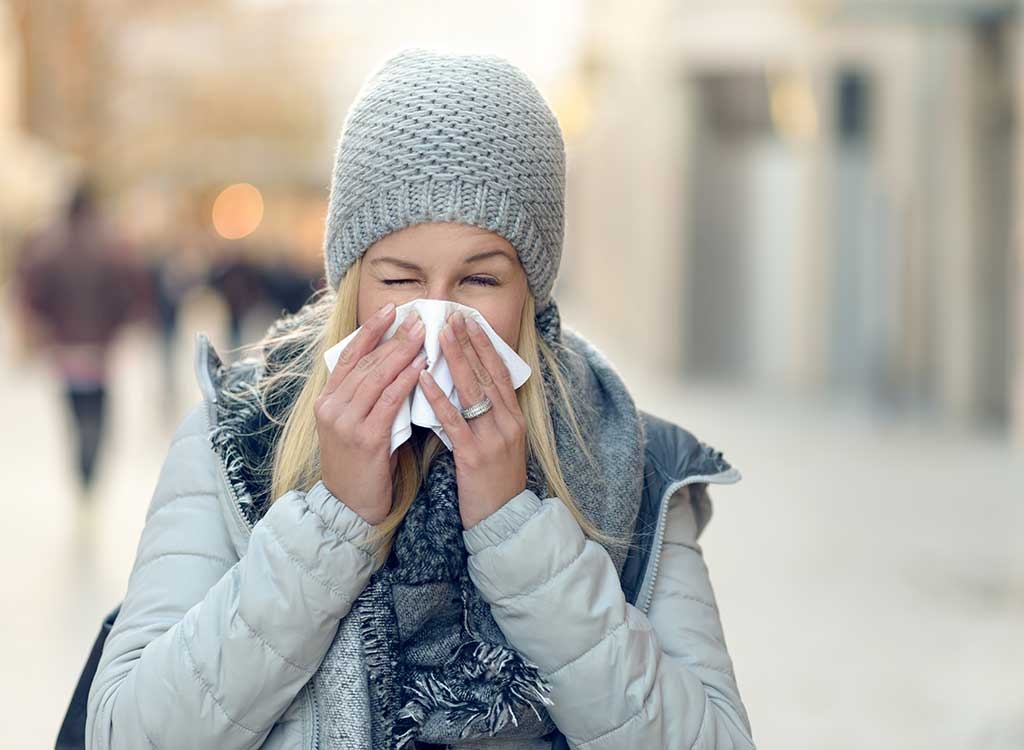
If you're constantly sneezing, have an itchy throat, and generally feel tired and terrible, you may think you have a cold. But it could actually just be allergies. What's worse, these allergies can lead into a cold or the flu without you realizing it. "Allergies are one of the most commonly overlooked contributors to cold and flus," Heather Bartlett, MD, family physician, says. "I recommend taking an over counter allergy medicine daily to prevent congestion, especially in geographic areas where folks are experiencing exceptionally long fall seasons and infrequent hard freezes."
Get a Flu Shot

It may seem like a no-brainer, but many people skip their flu shots every year, only to get sick once flu season rolls around. "I get my flu shot every year as soon as it's available, and stay up-to-date on all my other routine vaccines," Sadie LaPonsie, MD, and pediatrician, says. If your employer doesn't offer a flu shot and you can't make it to the doctor, visit a nearby pharmacy; Walgreens and Rite Aid administer flu shots on site. Speaking of drug stores, did you know the The Shocking Reason You're Paying 1000% More For Your Medication?
Eat Plenty of Prebiotics

"All health starts in the gut, including 70 percent of the immune system. A healthy gut primes the immune system, making it ready to take action and protect me from invading evildoers," Will Bulsiewicz, MD, gastroenterologist, says. "My prescription for optimal health and protection during cold and flu season is daily consumption of prebiotic fiber. A prebiotic is a nondigestible food that promotes the growth of beneficial microorganisms in the intestines. In other words, prebiotics aren't food for me, they're food for my gut bacteria. The best source of prebiotics are natural plant foods like onions, asparagus, wheat bran and bananas."
Go For Raw Garlic

"When I start to feel even the slightest bit sick, then it's time to unleash the healing power of raw garlic on the gut. Not only is raw garlic a rich source of prebiotics, but it also has antiviral and antibacterial properties that make it good to prevent a cold," Dr. Bulziewicz says.
"When I feel a tickle in the throat, I'll cut up 3 or 4 cloves of garlic into pills and wait 10 minutes," he adds. "Waiting allows an enzyme called alliinase to activate the garlic for its full effect. If you cook the garlic, you may lose the benefits. After that brief pause, I will swallow the pills down whole. I've repeatedly had an impending cold stop hard in its tracks using this method. Most of the time I feel better by the following day."
Load Up on Probiotics

In addition to keeping your gut healthy with prebiotic fiber, probiotics can also strengthen your gut health, which will in turn boost your immunity. Saravan Pramod Settipalli, MD, general medicine specialist and internist, recommends taking probiotics to boost your health. This could be an over-the-counter probiotic supplement or probiotic-rich fermented foods, such as organic sauerkraut, kimchi, kombucha, or yogurt.
Avoid Sick People
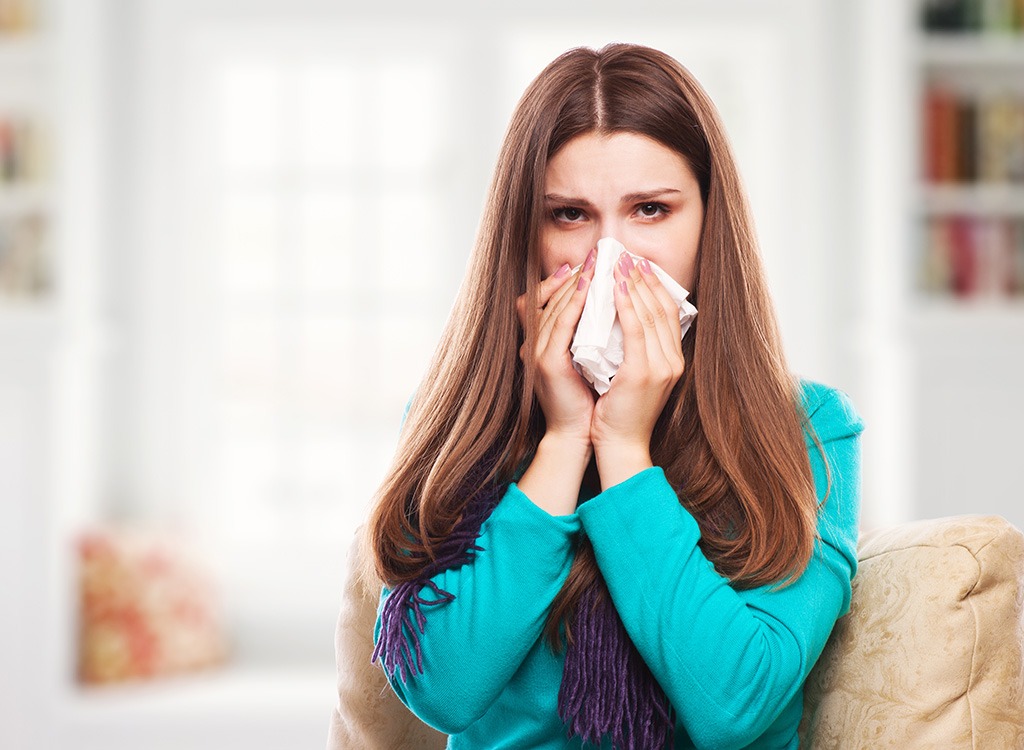
Even if you're not sick, your social life could take a hit during cold and flu season. As much as you still want to hang out with your sick friends, doing so could put you at risk for catching what they have. "Avoid spending time around sick people," advises Stephanie Long, MD, family physician.
Bring Your Lunch to Work
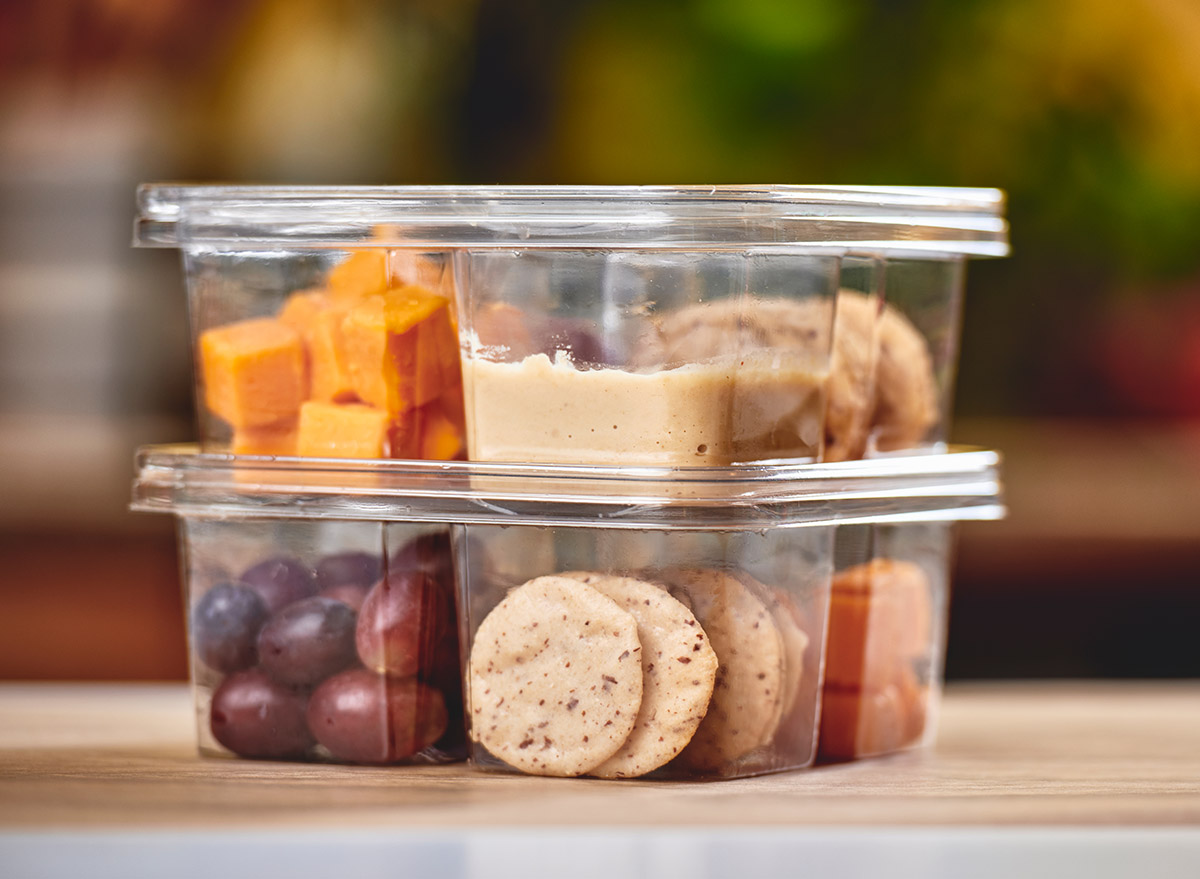
Sharing dishes and utensils at the office could put you at risk for picking up someone else's sick germs. "Flu season is the time to bring your own lunch to work where you can control food prep and ensure surfaces are clean," says Christopher Calapai, DO, family medicine specialist. Stumped on a healthy lunch to pack? Check out our list of 25 Super-Healthy Lunches Under 400 Calories.
Take a Sick Day

With how busy everyone's work schedules are, it may seem self-indulgent to take a sick day. But not only will this give you a chance to rest up, recover, and return to work at 100%, it also prevents your poor co-workers from being exposed to your sickness. "Stay home from work if you are experiencing flu symptoms," Dr. Calapai advises.
Or Work From Home

If you must work, do so from home if your work allows. These days with email, online chat networks like Slack, and conference calling, working remotely is easier than ever. This will help contain your sickness and not expose your colleagues. This goes for your co-workers, too. "Encourage co-workers to work from home when feeling sick," Dr. Calapai says. "These days it's easier for people to work from home at the slightest signs of cold or flu."
Cut Back on Sugar

Not only does eating too much sugar expand your waistline and put you at risk for chronic disease like type 2 diabetes and heart disease; it can slow your immune system, too. "Cut down on sugar, especially if you are starting to feel under the weather," Faisal Tawwab, MD, family medicine specialist, says. "Sugar makes it harder for white blood cells to fight back against illness." It's also one of the culprits on our list of 10 Foods That Double Your Risk of Acne.
Avoid Processed Food
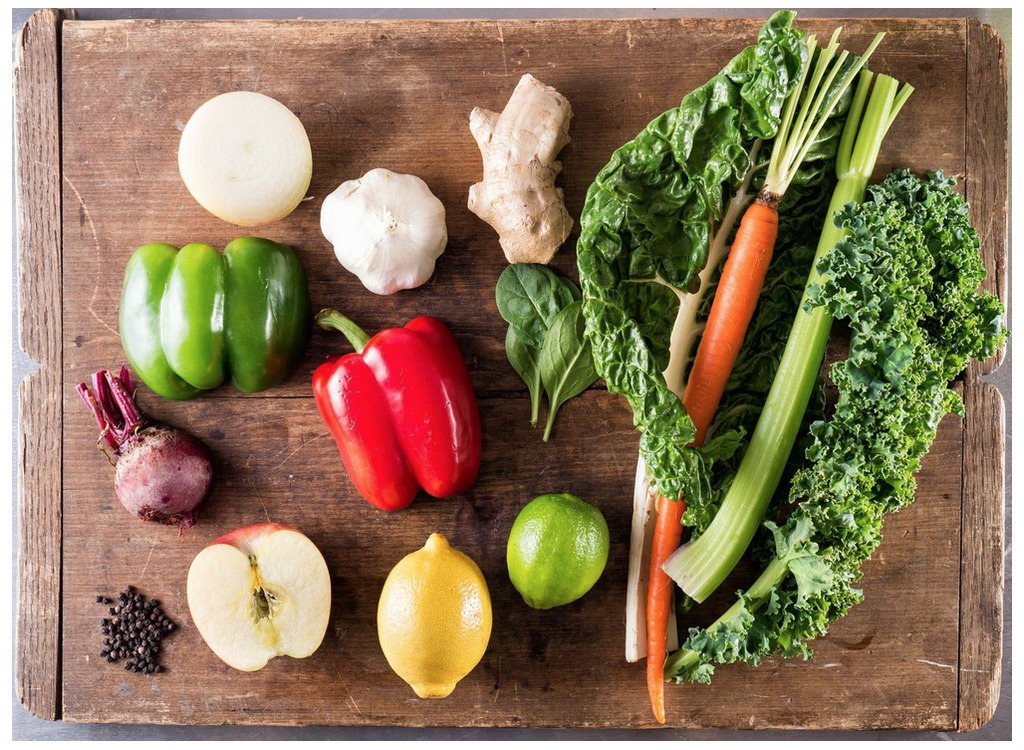
Like sugar, a diet heavy in processed foods can compromise your immune system. Dr. Stagg says she eats a diet rich in whole, natural foods and low in processed foods and sugar to keep her body at its healthiest.
Wear a Mask

This may seem dramatic, but if you're going to be in a heavily populated area like an airport or crowded train, wearing a mask can protect yourself from getting sick says Dr. Settipalli. "Learn that most flu cases are transmitted by coughing, sneezing, and even talking," he adds.
Exercise Regularly

Working out regularly can get your body—and immune system—in great shape. "I exercise regularly," Dr. LaPonsie says. "For me, the best way to stick to my fitness goals is to sign up for a race or event, think through my training plan, and put it in my calendar. I'm much less likely to skip workouts when I've scheduled them in advance."
Wash Your Hands Often

This is a no-brainer, but it bears repeating: wash your hands often during cold and flu season, especially before you eat. "Effective hand washing lasts as long as two verses of 'Row Row Row Your Boat,'" advises Ian Tong, MD, and chief medical officer at Doctor On Demand.
Carry Hand Sanitizer

Sometimes a sink and soap aren't nearby. This is where hand sanitizer comes in—Dr. Settipalli recommends keeping hand sanitizer handy. Have some on your desk, throw a bottle in your purse, and keep some at home. Although most doctors recommend washing hands over hand sanitizer, especially since it can dry out your hands, it's better than not sanitizing your hands.
Have Your Kids Wash Their Hands

It's no surprise kids are some of the biggest carriers of germs, especially when they're around other kids all day at school and day care. Dr. Tong recommends having your kids wash their hands before they leave school or daycare so they are germ-free before getting in your car.
Avoid Touching Your Face

Germs don't just spread when you eat something with contaminated hands; they can get into any open surface on your body, including your eyes and nose. Dr. Long recommends avoiding touching your eyes, nose, and mouth during cold and flu season.
Be Wary of Shared Spaces

"The workplace and public spaces are a hotbed for germs," Dr. Calapai says. "When you go from your office to the shared kitchen or conference room you can touch a surface and the germs will then enter your system leading to flu." This is why it's so important to wash your hands often and use hand sanitizer throughout the day at the office.
Forgo Handshakes

Dr. Tong advises against touching strangers during cold and flu season, including handshakes, especially if you notice they have been repeatedly sneezing or wiping their nose. "Avoid sick contacts and avoid touching their hands and fingers or items their hands and fingers have touched," he says. "This one could get you some looks, but fist and elbow bumps are perfectly acceptable when greeting a co-worker who sneezes into their hand right as you are greeting."
Don't Sweat the Small Stuff

Stress can really weaken your immune system, making you susceptible to catching a cold or flu. Try not to work yourself to the bone, otherwise you'll just make yourself sick. "Stress and anxiety can lower the immune system," warns Dr. Tong. "You have meetings to host and presentations to prepare, but is that choice of font really going to impact the content of your presentation?"
Meditate
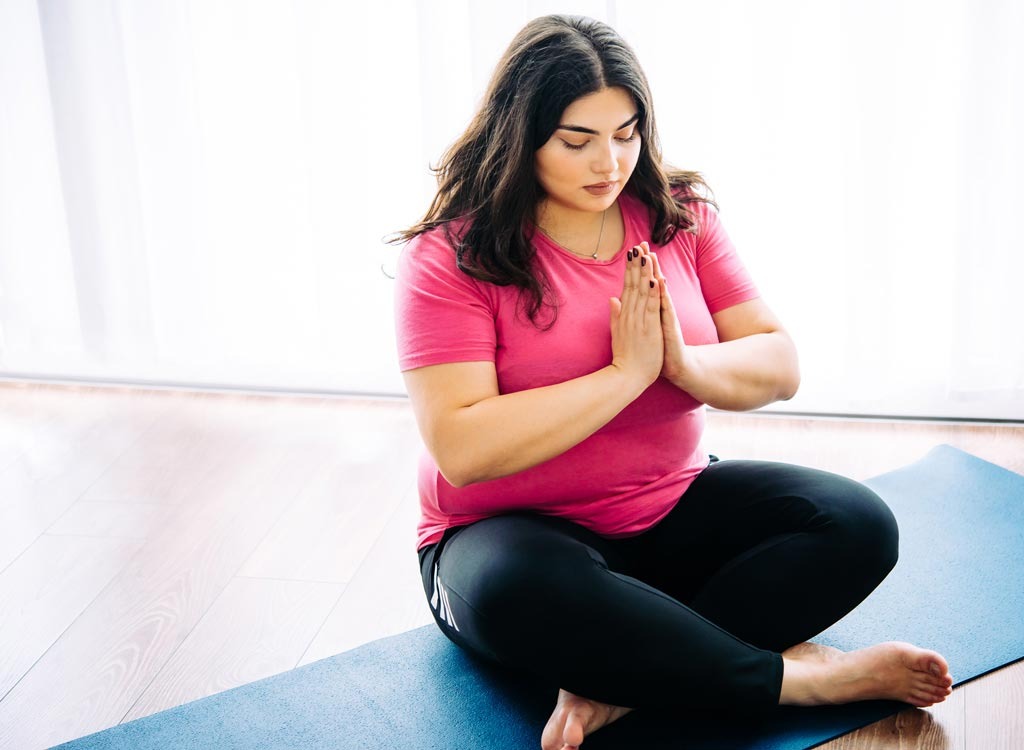
If your schedule is particularly hectic and stressful, meditation can work wonders. "Stress can have a significant effect on lowering your defenses," Dr. Settipalli says. "When it comes to stress, even 10 minutes of meditation or listening to music can do a lot to help you relax."
Get Enough Vitamin D

With colder temps, shorter days, and cloudy skies, it's no wonder our vitamin D levels are the lowest during cold and flu season. Unfortunately, this vitamin is essential in staying healthy. "Vitamin D is necessary for a healthy, robust immune system," Dr. Bulsiewicz says. "We've all noticed that cold and flu season occurs in the winter, when vitamin D levels are lowest. In a study out of Britain, supplementation with vitamin D reduced the likelihood of developing upper respiratory infections, supporting the theory that adequate Vitamin D levels are necessary to protect against infections."
Try Fish Oil

In addition to vitamin D, Dr. Stagg takes a fish oil supplement daily to help her immune system and keep her healthy.
Take Zinc

"At the first sign of cold I take zinc supplements to help boost my immune system," Dr. Tawwab says. Over-the-counter supplements like Zicam are loaded with zinc to help stop a cold in its tracks.
Wipe Down All Surfaces

Since common surfaces in your home like your countertop and door handles are a hotbed of germs, it's important to keep them sanitized. "Wipe down all surfaces with alcohol wipes," advises Dr. Tawwab.
Carry Sanitizing Wipes With You

And it's not just your home you should be wiping down; you need them for the gym, your car, and especially your office. "Bring your own wipes. Disinfectant wipes will make your office mates chuckle, but killing off the germs on the phone handset is worth the extra few seconds before you make that call," Dr. Tong adises.
Eat Your Antioxidants

Loading up on antioxidants can help boost your immune system says Megha Tewari, MD, family medicine doctor at Memorial Hermann The Woodlands Medical Center. She recommends eating plenty of fresh fruits and vegetables; some of the best sources of antioxidants include cranberries, strawberries, blueberries, kale, and spinach.
Change Your Air Filters

"Remember to change your home air filters, which can gather a lot of dust over few months," advises Dr. Tewari.
Steam it Out

Taking a long hot shower or spending a few minutes in a steam room may help stave off illness. "I think steam helps against upper respiratory illness," says Andrew Ordon, MD, surgeon and co-host on the TV show The Doctors.
Laugh

One of the easiest ways to boost your mood and alleviate stress is to laugh! Settipalli recommends laughing to strengthen overall health. After all, laughter really is the best medicine.
Load Up on Vitamin C

Dr. Ordon is a big believer in immunity boosters, he says, including vitamin C. You can load up on this immune-boosting vitamin through fresh citrus fruit like oranges and grapefruit. You can also head to your local juice bar and get a booster shot of fresh orange and ginger juice.
Take Turmeric

There's a reason turmeric has taken over; it's loaded with curcumin, an antioxidant which has anti-inflammatory properties. Dr. Ordon takes a turmeric immunity booster (you can find them at your local juice bar) when he starts to feel like he's coming down with something.
Increase Vitamin E
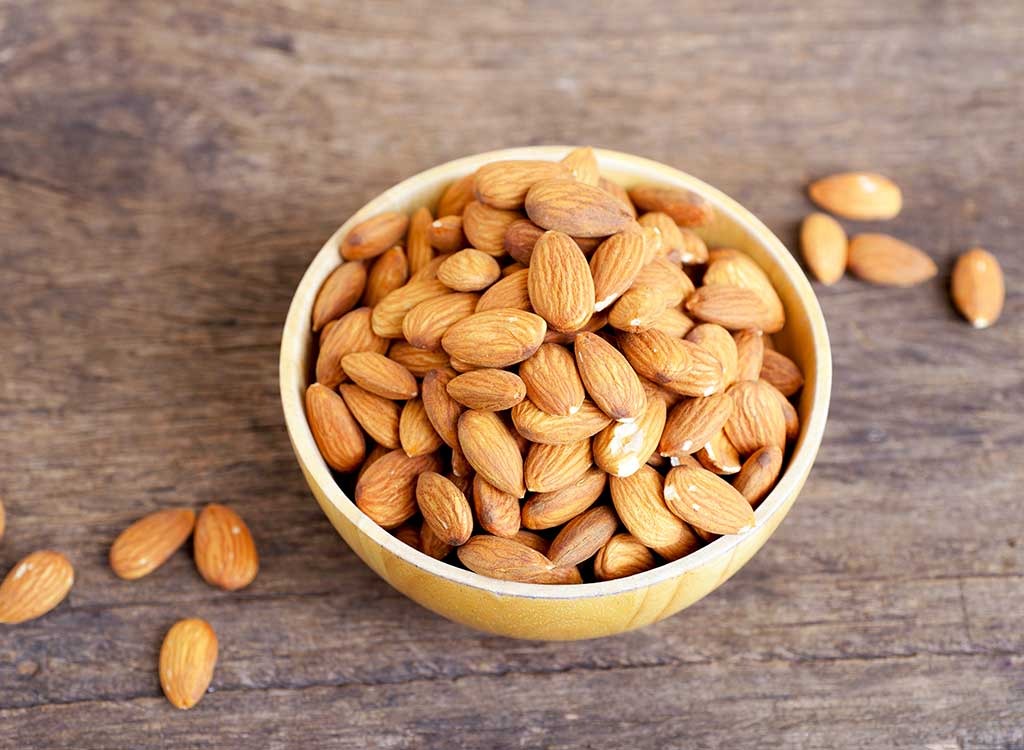
Although most people think to load up on vitamins C and D when it comes to fighting off sickness, vitamin E is an antioxidant that can help boost your immunity. Vitamin E is found in almonds, spinach, sweet potato, and wheat germ. Dr. Calapai recommends eating plenty of foods with vitamin E to stay healthy during cold and flu season.
Eat Enough Vitamin A

Another important vitamin for staying healthy is vitamin A, according to Dr. Calapai. Vitamin A is in carrots, sweet potato, kale, and beef liver. Just be sure to not go overboard; don't exceed 10,000 IU a day. Too much vitamin A can be toxic.








